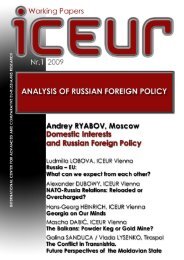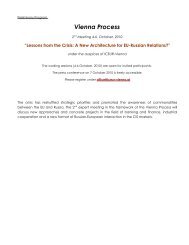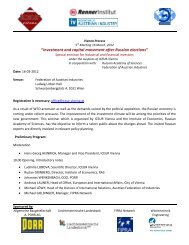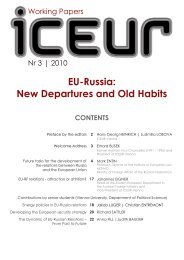Address - International Center for Advanced and Comparative EU ...
Address - International Center for Advanced and Comparative EU ...
Address - International Center for Advanced and Comparative EU ...
You also want an ePaper? Increase the reach of your titles
YUMPU automatically turns print PDFs into web optimized ePapers that Google loves.
Alex<strong>and</strong>er DYNKIN<br />
Global Turmoil: Challenges <strong>for</strong> Russia<br />
Union. The role, which in the 1970s was played by a rapidly developing Japan, nowadays is claimed by<br />
South Korea, India <strong>and</strong> Brazil. This trend is strengthening. As the “guru” of the current global crisis, Nouriel<br />
Roubini noted, the composition of the club of major emerging market economies is revised constantly by<br />
widening it from BRIC (Brazil, Russia, India, China) to BRICET (adding Eastern Europe <strong>and</strong> Turkey) or<br />
BRICKET (the <strong>for</strong>mer plus the Republic of Korea). Moreover, the BRIC index inventor Goldman Sachs is<br />
introducing the new term “Next –11” (adding to BRIC Bangladesh, Egypt, Indonesia, Iran, Mexico, Nigeria,<br />
Pakistan, the Philippines, R. of Korea, <strong>and</strong> Turkey). Naturally, the world has become more complex,<br />
globalized, interdependent <strong>and</strong> transparent than in the 1970s. But the political mise en scene remained<br />
mostly the same, though the actors have partly changed. This is testament to a certain conservatism (or<br />
continuity) in the development of the very structure of international relations <strong>and</strong> world politics.<br />
Russia – “the sick man” of BRIC<br />
The global financial crisis hit the Russian economy, breaking its most prosperous period of development<br />
since 1991. From 2000 to autumn 2008, the Russian economic rate of growth was about 7% annually,<br />
positioning the country among the most dynamic economies in the world. The Russian budget surplus was<br />
about $ 80 billion. Russia, in 2008, had a record export ($468 billion) <strong>and</strong> payments balance ($200 billion).<br />
Its international reserves in August 2008 were equal to $597 billion. The exchange rate of the ruble had risen<br />
steadily since 2001. At the end of the year, the situation dramatically changed (see Graph 2). Nevertheless,<br />
even at the end of 2008, Russia kept the 3rd position in the world in reserves of <strong>for</strong>eign exchange <strong>and</strong> gold,<br />
the 5th in current account balance, the 7th in GDP, the 9th in export <strong>and</strong> the 10th in stock of direct <strong>for</strong>eign<br />
investment, while it occupied a dismal 22nd rank in external debt <strong>and</strong> 117th in public debt.<br />
GNP Rate of Growth, %<br />
14.0<br />
12.0<br />
10.0<br />
8.0<br />
6.0<br />
4.0<br />
2.0<br />
0.0<br />
-2.0<br />
-4.0<br />
-6.0<br />
2000<br />
2001 2002 2003 2004 2005 2006 2007 2008 2009 2010<br />
World Russia USA China<br />
Graph 2<br />
Such a sharp economic slump, which is especially obvious in comparison with other BRIC member states<br />
was mainly determined by specific features of the Russian national economy. Russian financial institutions<br />
did not fall <strong>for</strong> the game with financial derivatives. Thus, the impact of the crisis differs from that which is<br />
taking place in the advanced market economies. Starting from August 2008, our economy has suffered from<br />
three simultaneous shocks.<br />
Firstly, the fall of oil prices: in Russia, the export of hydrocarbons contributes up to 40 % of budget revenues.<br />
Secondly, the capital outflow from the stock market. Some of our politicians <strong>and</strong> experts were very proud of<br />
the fact that be<strong>for</strong>e the crisis, stock market capitalization was higher than the GDP volume. Anyway, the<br />
6 IC<strong>EU</strong>R-Vienna Working Papers 2|2009









